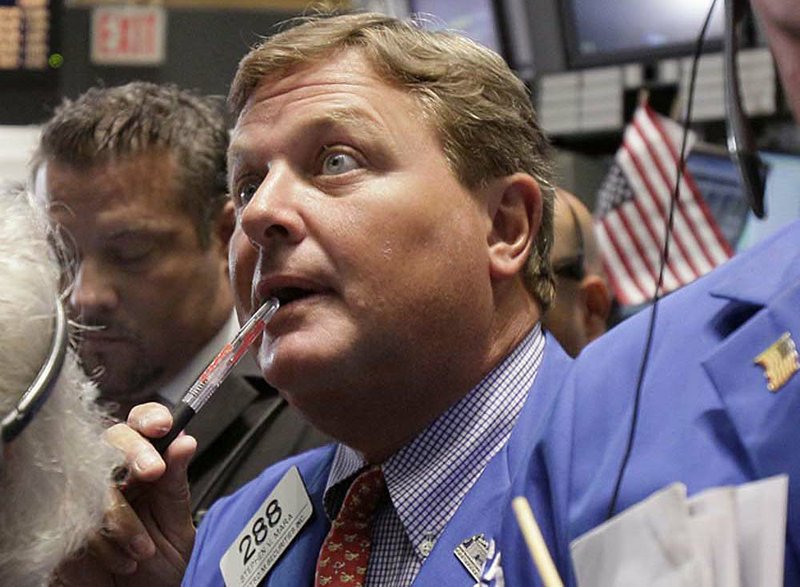NEW YORK — Stocks on Wall Street continued to climb Monday after recent big losses, notching the markets’ first three-session win streak in six weeks.
A $19 billion corporate buying spree and encouraging economic news from Japan sent the Dow Jones industrial average up 213 points and erased the cumulative loss from last week’s wild swings.
The return of what’s called “Merger Monday” on Wall Street, headed by Google Inc.’s $12.5 billion acquisition of Motorola Mobility, made investors more optimistic. And Japan said its economy shrank at just a 1.3 percent annual rate from April through June, less than half the drop that economists expected after the earthquake, tsunami and nuclear crisis that struck the country March 11.
Those developments helped ease worries that the U.S. economy may slide into another recession.
The Dow rose 213.88 points, or 1.9 percent, to 11,482.90. It has gained 763 points since Thursday. That’s the best three-day point gain since it rose 927 in November 2008, during the depths of the financial crisis. The Dow is also up 7.1 percent over the three days, the biggest percentage gain since it rose 9.5 percent the first three days of the bull market in March 2009.
The broader Standard & Poor’s 500 index rose 25.68, or 2.2 percent, to 1,204.49. The technology-heavy Nasdaq composite index rose 47.22, or 1.9 percent, to 2,555.20.
“We’ve been putting money back in the equity market,” said Jeffrey Saut, chief investment strategist at Raymond James & Associates in St. Petersburg, Fla. “You’re dealing with oversold levels. I do expect to see more takeover deals. If we don’t go into a recession, we’ve made a low for the year. All the ingredients are there for some kind of bottom.”
Despite its three-day gain, the Dow remains down 9.8 percent since its most recent high on July 21 and down 10.4 percent since its 2011 high set on April 29.
Financial analysts warned investors not to assume that stocks have fully settled down after last week’s swings. The Dow rose or fell by at least 400 points in four straight days for the first time. The first downgrade of the U.S. credit rating, a move to AA+ from AAA by Standard & Poor’s on Aug. 5, triggered the volatility. It was worsened by concerns that Europe’s debt problems are deepening and that the U.S. economy is weakening.
“You might have these moments of quiet, but the debt crisis in Europe did not go away,” said John Hailer, chief executive for the U.S. and Asia of Natixis Global Asset Management. “Our issues with the debt, with what our tax policy is going to be going forward, our unemployment, did not go away.
“We are probably going to have to look at some very different levels of volatility than what a lot of investors grew up with over the last 25 to 30 years,” he said.
A period of relative stability has been common in past volatile markets. In 2008, stocks plunged between mid-September and mid-November. From mid-November until the beginning of January 2009, the Dow was in a lull of sorts. It ratcheted up and down, mostly in the high 8,000 range. But in early January 2009, it began to plunge again and finally hit bottom at 6,547 on March 9.
More swings could come this week. Leaders of France and Germany meet today to discuss Europe’s debt problems. Spain and other countries have borrowed so much that they may need help to repay their bills. Investors today will get an update on how Spain’s economy did during the second quarter.
Corporate deals dominated Monday’s news, as companies followed a years-long practice of announcing acquisitions on a Monday. In addition to Google’s acquisition of wireless-phone maker Motorola Mobility, Time Warner Cable Inc. said it will pay $3 billion in cash for Insight Communications Co., which has more than 750,000 cable customers in the Midwest. Agribusiness conglomerate Cargill said it will buy animal nutrition company Provimi of the Netherlands for $2.16 billion. And in the energy industry, offshore driller Transocean Ltd. said it will buy Aker Drilling of Norway for $1.43 billion in cash.
“Investors are seeing that company managements are still pretty aggressive with these high-profile acquisitions. It suggests that if management is optimistic, we can be optimistic,” said Jack Ablin, chief investment officer for Chicago-based Harris Private Bank.
Companies across the United States have accumulated a record amount of cash since the recession ended. They have increased their cash reserves every quarter for more than two years. Those in the S&P 500 index had a total of $963.3 billion at the end of March, according to the most recent data from Standard & Poor’s.
Investors have been waiting for companies to use some of that cash on acquisitions, dividend increases and stock buybacks. Many market strategists believe that companies are more confident about the future if they’re willing to buy other businesses. So a series of acquisition announcements tends to send stocks higher.
The growing cash hoard has been the result of strong profits. Companies have kept costs low by being slow to hire. Revenue, meanwhile, is growing, particularly from overseas customers. For the 460 companies in the S&P 500 that have reported second-quarter results, earnings were up 12 percent from a year ago.
“Companies have a lot of cash and they are taking advantage of the great valuation out there in what they see as a still good earnings environment,” said New York-based Kevin Shacknofsky, a manager for Alpine Mutual Funds. “If it happens to a great degree, it will be very beneficial for the market. It will be a strong catalyst.”
Information for this article was contributed by Stan Choe of The Associated Press and by Rita Nazareth of Bloomberg News.
Front Section, Pages 1 on 08/16/2011
